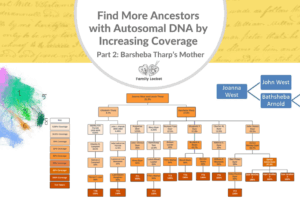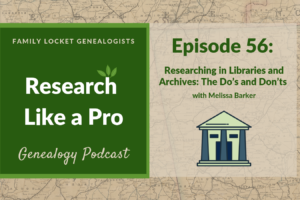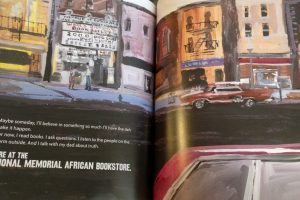
My favorite article this week is from Deseret News about starting with hearts, not charts, and the implications for involving the next generation in family history. CEO Steve Rockwood shares why this is FamilySearch’s new mantra for recruiting beginners. He said, “Starting with a story … would ultimately lead to the important data. … “Let’s start with something that everyone can participate in, everyone can get excited about.”
‘Start with the heart vs. the chart’ and share family stories
An interview with Stephen Rockwood, CEO of FamilySearch International, about the importance of discovering, preserving and sharing family stories.
A thought provoking post at Sassy Jane Genealogy talks about why we do genealogy. Some have asked, “is genealogical research really important?” The author quotes a response from professional historian Alexandra M. Lord, who said, “Although rarely discussed, tapping into the love of history found among genealogists, preservationists and others is crucial if we are to promote the study of academic history. We need to ensure that our conferences are welcoming not only to academic historians but also to those who love history and do history within their communities.” Read more here:
Why We Do Genealogy
Back when I was a working archivist-librarian, the bosses who held the purse-strings would ask me why we should even bother with all that old stuff. After all, it was so expensive to take care of and nobody really cared about those dusty old archives.
I am fascinated by the demographics of the genealogical community. James Tanner shared statistics and his perspective on them from a genealogical conference in Arizona in a recent post on Genealogy’s Star. I believe the statistics he shares actually show who attends genealogy conferences, not who is actually doing genealogy research. What do you think?
Genealogy’s Star: Who are we? A Genealogical Perspective
Who are we? Along with the difficulty in defining genealogy at all, this is one of most interesting questions about being a genealogical researcher. The Mesa FamilySearch Library recently held a conference in Peoria, Arizona, on the westside of Phoenix, Arizona and gathered some interesting statistics on those who attended.
Creating and Sharing Family History
I love this quote from Allison Kimball’s post on the FamilySearch blog: “I hope that each of my grandchildren or great grandchildren can hold and cherish a notebook filled with things that are most important to me. I hope they will know that I thought of them, even if I never get a chance to meet them. I hope, like Guelito Cuco, that people will always know that I loved my family and they are most precious to me.” Read more:
Family Memories: Allison Kimball Shares a Favorite Genealogy Artifact
Documents tell stories. As we explore the branches of our family tree, we rely on genealogy artifacts to illuminate the lives of ancestors and gain a better understanding of where we come from. Over the past months, we have been honored to tell stories about genealogy documents that helped enrich the family heritage of some of our favorite genealogists.
The memories shared in Christine Arata’s post on the Association of Personal Historians were touching. Her client wrote, “I was eighteen when [Gramp] died and it wasn’t until many years later that I realized he had a certain charisma that would always be with me. His spirit is alive!” She added, “I wanted to stand on the shores of Galway Bay and imagine what thoughts my grandfather was experiencing when he left, never to return again.” Read more:
An Open Arms Embrace on Galway Bay
It was my client Patricia Lee’s cherished childhood memories of her Irish grandfather that led to her first visit to Ireland. Gramp, as she called him, was officially named Patrick Egan. In her memoirs, writing about her grandfather, she recounted, “I was eighteen when he died and it wasn’t until many years later that I realized he had a certain charisma that would always be with me.
Joyce Krieg wrote about her personal mission to preserve her past. “You may think that historians and museums will take care of preserving our culture, but that isn’t always the case. Too often, the resources of those institutions go toward chronicling the major events in our past and the larger-than-life figures who made history happen. The experiences of us ordinary people are often forgotten and lost – until it’s too late.” Read more:
Joyce’s Personal Mission to Preserve Her Past
“KEEPERS OF OUR CULTURE” by Joyce Krieg I like to tell people I grew up in San Jose “before it became Silicon Valley.” By that, I mean the 1950s and 60s, when the South Bay was still dotted with orchards, and the huge office parks of companies like Google, Adobe, Yahoo and Facebook were light…
3 Ways to Use Warmer Weather to Strengthen Memories of Loved Ones
by · The bright yellow pop of daffodils around my neighborhood reminds me of one of the most creative ideas I’ve come across for keeping memories of loved ones alive. Read on for this innovative springtime strategy and two others. Grow Daffodils. In a time of loss, give a wicker basket full of daffodil bulbs.
Children’s Book About Irish King Inspired by DNA Research
I wish history had been taught differently when I was a child. History was dry and boring and consisted of rote memorization of dates of disconnected events. At least, those events were entirely disconnected from me. It would only be years later that I understood their relevance and that many of those events were NOT disconnected from…
Suppose You Were the Only One
Suppose you were the only one who knew: Your father liked to listen to freight trains passing his house when he was a boy. At night he’d lie his blonde head down & listen to the trains rattling along the tracks and he’d count the long line of cars until he became drowsy and dreamed of trains. Would you tell your son?
Creating a Family Story and Memory Book
Recently Volume 2 of my McGinnis Family Story Books arrived from Shutterfly. I’m really pleased with how it turned out! First I scanned the family photos I wanted to use in my book. After transferring the scanned photos to my computer I organized them into a directory on my laptop Then I uploaded them to Shutterfly.
Ethics, Etiquette and Old Family Letters
When it comes to genealogy and reading other people’s mail, ethics and etiquette are two sides of the same coin. Is it morally correct (ethical) to read other people’s mail? Is it socially acceptable (proper etiquette) to do so? Family historians have been uncovering long-buried family secrets long before genetic testing was available.
LDS
Howard W. Hunter: 5 Adorable Facts from His Childhood (+ Journal Entries and Photos)
As we have been learning about President Howard W. Hunter this year in Priesthood and Relief Society, we have mostly gotten to know about him as an adult-a leader of the Church with profound ideas and a strong testimony. But what was he like as a child?
Provo City Center Temple Dedication Challenges Member Involvement in Family History
In speaking at the first session of the dedication of the new Provo City Center Temple in Provo, Utah, Elder Dallin H. Oaks of The Quorum of the Twelve Apostles, renewed the challenge expressed by Elder Dale G. Renlund, also a member of Quorum of the Twelve Apostles. What is the challenge?
Research Tips
Not just Rip Van Winkle – Vita Brevis
As anyone engaged in the study of family history knows, researching the women of the past can be a difficult process. Many commonly used sources draw out details in the lives of men but provide only minimal statistical information about the lives of women.
Women’s History Month Tip #21 Cookbooks!
Really, you didn’t think we could do a month worth of tips and not mention cookbooks? Cookbooks are important. They are a genealogy source, especially community cookbooks which are very similar to other genealogical sources like city directories. Community cookbooks are at the very least a “names list.”
Slave Name Roll Project: RELEASING Nell and child, Hannah, Tom and Will
Following my three part series on the slaves of my 5th grand-father James Sims during Black History Month in February 2015 I made a commitment to write a post on a monthly basis until I’ve RELEASED all of the names of slaves owned by my ancestors.
Blog Posts and FamilySearch Family Tree
Do you sometimes write blog posts in which you share an analysis of several census records about a specific individual and his or her family? What about an evaluation of a court document for an ancestor to help identify children and their spouses? Maybe you’ve posted graduation or marriage certificates and written about them?
Do I Really Need to Join My Local Society? I Have No Ancestors From My Area…
I have no ancestry from Ohio. It is my home state, but I am the only one who was born and raised here in my ancestry. In the 1880 U.S. Federal Census, I have a set of grandparents that are found in Darke County, Ohio.













4 Comments
Leave your reply.